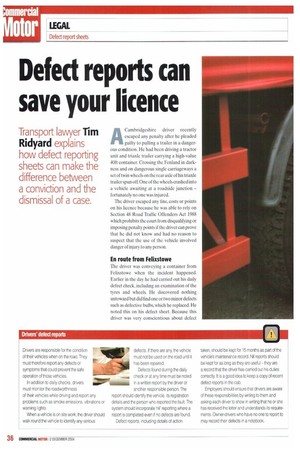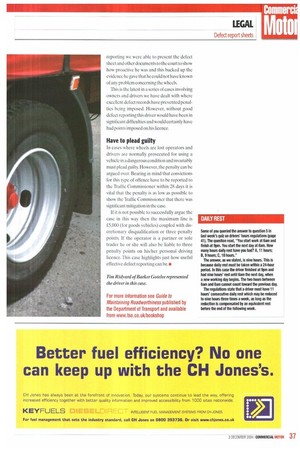Defect reports can save your licence
Page 36

Page 37

If you've noticed an error in this article please click here to report it so we can fix it.
Transport lawyer Tim
Ridyard explains
how defect reporting sheets can make the difference between a conviction and the dismissal of a case.
ACambridgeshire driver recently escaped any penalty after he pleaded guilty to pulling a trailer in a dangerous condition. He had been driving a tractor unit and triaxle trailer carrying a high-value 401t container. Crossing the Fenland in darkness and on dangerous single carriageways a set of twin wheels on the rear axle of his triaxle trailer spun off. One of the wheels crashed into a vehicle awaiting at a roadside junction — fortunately no one was injured.
The driver escaped any fine, costs or points on his licence because he was able to rely on Section 48 Road Traffic Offenders Act 1988 which prohibits the court from disqualifying or imposing penalty points if the driver can prove that he did not know and had no reason to suspect that the use of the vehicle involved danger of injury to any person.
En route from Felixstowe
The driver was conveying a container from Felixstowe when the incident happened. Earlier in the day he had carried out his daily defect check, including an examination of the tyres and wheels. He discovered nothing untoward but did find one or two minor defects such as defective bulbs, which he replaced. He noted this on his defect sheet. Because this driver was very conscientious about defect reporting we were able to present the defect sheet and other documents to the court to show how proactive he was and this backed up the evidence he gave that he could not have known of any problem concerning the wheels.
This is the latest in a series of cases involving owners and drivers we have dealt with where excellent defect records have prevented penalties being imposed. However, without good defect reporting this driver would have been in significant difficulties and would certainly have had points imposed on his licence.
Have to plead guilty
In cases where wheels are lost operators and drivers are normally prosecuted for using a vehicle in a dangerous condition and invariably must plead guilty. However, the penalty can be argued over. Bearing in mind that convictions for this type of offence have to be reported to the Traffic Commissioner within 28 days it is vital that the penalty is as low as possible to show the Traffic Commissioner that there was significant mitigation in the case.
If it is not possible to successfully argue the case in this way then the maximum fine is £5,000 (for goods vehicles) coupled with discretionary disqualification or three penalty points. If the operator is a partner or sole trader he or she will also be liable to three penalty points on his/her personal driving licence. This case highlights just how useful effective defect reporting can be.• Tim Ridyard of Barker Gotelee represented the driver in this case.
For more information see Guide to Maintaining Roadworthiness published by the Department of Transport and available from www.tso.co.ukthookshop




















































































































































































